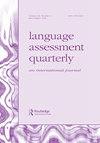Investigating the Skills Involved in Reading Test Tasks through Expert Judgement and Verbal Protocol Analysis: Convergence and Divergence between the Two Methods
IF 2.8
2区 文学
0 LANGUAGE & LINGUISTICS
引用次数: 2
Abstract
ABSTRACT Expert judgement has been frequently employed with reading assessments to gauge the skills potentially measured by test tasks, for purposes such as construct validation or producing diagnostic information. Despite the critical role it plays in such endeavours, few studies have triangulated its results with other types of data such as reported test-taking processes. A lack of such triangulation may bring the validity of experts’ judgements into question and undermine the credibility of subsequent procedures that build on them. In light of this, this study compared two groups of language experts’ judgements on the content of two sets of reading test tasks with ten university students’ verbal reports on solving those tasks. It was found that convergence was achieved between the two information sources for about 53% of the test tasks on what they were mainly assessing. However, there was a bigger gap between them regarding the specific skills involved in each task. A careful examination of the discrepancies between the two sources revealed that they are attributable to a number of factors. This study highlights the need to cross-check the results of expert judgement with other data sources. Implications for future test development and research are also discussed.从专家判断和言语协议分析研究阅读测试任务的技巧:两种方法的异同
摘要专家判断经常被用于阅读评估,以衡量测试任务可能衡量的技能,用于结构验证或产生诊断信息。尽管它在这些努力中发挥着关键作用,但很少有研究将其结果与其他类型的数据(如报告的考试过程)进行三角化。缺乏这种三角测量可能会使专家判断的有效性受到质疑,并损害建立在这些判断基础上的后续程序的可信度。有鉴于此,本研究将两组语言专家对两组阅读测试任务内容的判断与十名大学生对解决这些任务的口头报告进行了比较。研究发现,在他们主要评估的测试任务中,约53%的测试任务在两个信息源之间实现了趋同。然而,在每项任务所涉及的具体技能方面,他们之间的差距更大。对两个来源之间的差异进行仔细审查后发现,这些差异可归因于若干因素。这项研究强调了将专家判断结果与其他数据来源进行交叉核对的必要性。还讨论了对未来测试开发和研究的启示。
本文章由计算机程序翻译,如有差异,请以英文原文为准。
求助全文
约1分钟内获得全文
求助全文

 求助内容:
求助内容: 应助结果提醒方式:
应助结果提醒方式:


